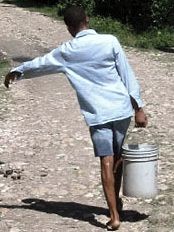Haitian All-Starz
The Best Representation of Haitian Entertainment, Culture, & LifeStyle
Haiti - Social : 1.6 million to fight against the exploitation of the "restavèks"
 |
The USD 1.6 million from the US Department of State, Office to Monitor and Combat Trafficking in Persons (GTIP) and by the United Nations Children's Fund, UNICEF, will support a programme focusing on children drawn into the restavèk system of domestic slavery in Haiti and the Dominican Republic.
This includes IOM and partners working to raise awareness of the problem in the heartland where it is originates, partly through a mass communications programme involving radio messages.
Women and girls abused and exploited in this industry in Haiti will also be assisted. A research element focusing on identifying the main drivers of this trade involving Haitian and Dominican minors will provide urgently needed insight into the issue which has been largely unexplored.
About 500 victims across Hispaniola will be given direct assistance through this new funding including medical care, as well as psychosocial, nutritional, and educational support. IOM helps reintegrate victims into society with micro grants to the parents of trafficked children and adult victims to provide livelihood options that will help lessen the risks of fall again in such situations due to poverty.
More than 650 victims have been directly assisted by IOM in Haiti since 2004 to regain some sort of normalcy in their lives. The Organization's counter-trafficking activities in Haiti also include strengthening the counter-trafficking legal framework. The Haitian government has been supported in drafting a counter-trafficking bill currently before the Haitian Senate. IOM also strengthens the institutional capacity of immigration, police, judiciary and social workers through counter-trafficking and counter-smuggling training sessions.
All IOM counter-trafficking activities involve close collaboration with Haitian governmental institutions such as the Institute of Social Well Being and Research, IBESR, and the Brigade for the Protection of Minors – a branch of the National Haitian Police responsible for minors – as well as with the Ministry of Social Affairs and the Ministry of Women Affairs and Rights.
Article By HL/ HaitiLibre
Social Network
All-StarZ TV
Events
Birthdays
Birthdays Tomorrow
© 2026 Created by Haitian All-Starz.
Powered by
![]()
 Haitian Gourde Converter
Haitian Gourde Converter



You need to be a member of Haitian All-Starz to add comments!
Join Haitian All-Starz